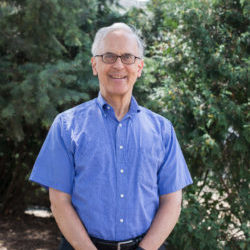Mentored by Jesus to Mentor Others: Part 2
In my last article, I explored the concept of mentoring using the story of Jesus’ post-resurrection encounter with two of his disciples on the road to Emmaus.
That biblical foundation allows us to examine three key principles of mentoring more carefully: depending upon the Holy Spirit, listening carefully to what is really being spoken, and cultivating the art of asking good questions.
The Holy Spirit as Mentor
First and foremost, the Holy Spirit is the primary mentor. Without the Spirit’s guidance no one would be able to effectively listen or walk with another person or group of people. While Luke 24 does not specifically mention the Holy Spirit, we know that Jesus never did anything in isolation from God the Father or God the Holy Spirit. Further, in the Upper Room, Jesus prepared his disciples for his departure when he taught them, “But when he, the Spirit of truth comes, he will guide you into all truth. He will not speak on his own, he will speak only what he hears” (John 16:13, NIV).

It is common in many churches to use a prayer for illumination before reading Scripture or preaching. This prayer recognizes both the guidance of the Holy Spirit as well as the inability to preach using merely human intellect or effort. Similarly, every conversation with a mentee would benefit from depending upon the Holy Spirit to illuminate our ability to listen carefully, seek clarity, provide guidance, reduce distractions, and assist in discernment.
I have found it helpful to engage in an ongoing conversation with the Holy Spirit. Essentially as I seek to listen to the other person, I am continually checking ideas and being alert to the promptings or impressions of the Spirit in how to walk with this person or group of people.
One example is that a new mentoring relationship can often begin with the other person pouring out their heart in a number of different ways. As I listen, I seek to gain insight from the Holy Spirit about which thread to gently pull first to develop our conversation. But at times when I sense uncertainty, I might say something like, “Wow, you are thinking about a lot of really important things at this time, where would you like to begin?”
More specifically, mentoring is about helping the individual to notice and name the Holy Spirit’s presence. We need to realize and remind the person that God is already at work in their life. Therefore, a frequent question in mentoring is, “Where do you notice God’s presence in your life?” Or, “Where is the Spirit at work in you now?” A helpful variation of this is to ask, “What helps you and hinders you in noticing the Spirit’s (or God’s or Jesus’s) presence?” If we know what helps us to recognize God, how can we seek to pay attention to those things? And if we know some of the obstacles that block our awareness of God, what can we do to minimize them?
Attentive Listening in Mentoring
Attentive listening involves creating a space to receive not only the spoken word but equally to be alert to how the tone of voice and body language can reveal more fully the nature and content of a conversation.
 The parallelism of Hebrew poetry can teach us how to develop this. For example, “The Lord is my light and my salvation—whom shall I fear? The Lord is the stronghold of my life—of whom shall I be afraid? (Psalm 27:1, NIV). The second phrase of this synonymous parallelism repeats, almost identically, the theme of the first stanza, but the slight variation of words amplifies the original thought. This repetition gives poetry its power and increases the ability to memorize and retain its message.
The parallelism of Hebrew poetry can teach us how to develop this. For example, “The Lord is my light and my salvation—whom shall I fear? The Lord is the stronghold of my life—of whom shall I be afraid? (Psalm 27:1, NIV). The second phrase of this synonymous parallelism repeats, almost identically, the theme of the first stanza, but the slight variation of words amplifies the original thought. This repetition gives poetry its power and increases the ability to memorize and retain its message.
Psalm 96:1–2 (NIV) offers another example, “Sing to the Lord a new song; sing to the Lord, all the earth. Sing to the Lord, praise his name; proclaim his salvation day after day.” In this example of synthetic parallelism, the second verse extends the meaning even more by adding the theme of God’s salvation.
Hebrew parallelism serves the same purpose as a sounding board in a piano or guitar. It takes the initial sounds and magnifies or broadens the scope of the original message. This is a common practice when counseling or even listening to others in casual situations. As we know from our own experience this simple practice can provide permission for the other person to say something more and often stir them to discover something that they did not know or understand previously.
Here is one scenario, a friend reports, “I am feeling overwhelmed by all that is expected of me right now and I feel so utterly exhausted.” You could respond and amplify this statement by saying, “You really do sound swamped, any idea what your next steps could be?”
One challenge in listening to others is that there are often many other conversations going on in our minds. Or we hear something from the person in front of us and it immediately reminds us of something else. This is where bracketing is important.
When we hear something that connects with our own stuff, we need to be careful that we don’t change the focus to ourselves and answer by saying, “I know just what you are talking about.” Or “That reminds me of a similar situation I once had.” Once we divert the focus onto us the mentee is less likely to believe that we are really listening to them or interested in their concerns.
Here again is another way that the Holy Spirit can guide us by assisting us to know when we need to be quiet or pause before speaking.
Cultivating the Art of Using Questions Wisely
When it comes to asking questions, this is another place we can be guided by Jesus. Questions were one of the most common methods he employed in his teaching.
We need to remind ourselves that we are not Jesus, but we can learn from him by studying his methods and principles. Here are a few examples of Jesus’ questions: “What is your name?” (Mark 5:9, NIV; cf. Luke 8:30). “What are you looking for?” (John 1:38, NLV). “What does it profit them if they gain the whole world, but lose or forfeit themselves?” (Luke 9:25, NRSV). “And can any of you by worrying add a single hour to your span of life” (Matthew 6:27, NRSV; cf. Luke 12:25)?
Questions are far more effective than direct statements, especially in delicate situations. For example, if a person is considering doing something impulsive, to declare, “You can’t be serious to do that!” or “That is the most foolish response you could take” would not be very productive. Rather you might reply, “I wonder what the implications of that might be for you if you continued down that path?” or “Where do you think you might end up if you followed that behavior?”
Questions, especially those that are open-ended, require more than a simple “yes” or “no” response. They are beneficial in mentoring because they enlarge both the mentor and mentee’s abilities to listen to God and themselves. Questions encourage greater dialogue and are valuable in determining needs.
One of the most powerful effects of a good question is that it resembles a time-release capsule that continues to work in a person’s mind and heart after the conversation has ended. It can often be effective to conclude a mentoring session by asking a question for the person to ponder until your next session.
Questions can also create an invitation for welcome and hospitality. Since trust is critical, confidentiality must be clearly communicated and practiced.
 Finally, our queries need to be honest, meaning that we are interested in learning the response. Our questions should be appropriate for the level of trust within the relationship. As we grow deeper, we can inquire about more personal things. But we must be cautious and avoid both being too invasive and asking too many questions that could threaten the person. When in doubt it can be helpful to preface a question by saying, “I wonder if this question is appropriate for you, if not please don’t feel you need to respond.”
Finally, our queries need to be honest, meaning that we are interested in learning the response. Our questions should be appropriate for the level of trust within the relationship. As we grow deeper, we can inquire about more personal things. But we must be cautious and avoid both being too invasive and asking too many questions that could threaten the person. When in doubt it can be helpful to preface a question by saying, “I wonder if this question is appropriate for you, if not please don’t feel you need to respond.”
Conclusion
Mentoring takes time, but I have discovered again and again that the results are always worth it. In our life, work, and leadership, we have unlimited opportunities to use these basic principles.
When we consider the investment that others have made in us, how can we pass along similar encouragement and guidance to others?

Click here to read Part 1.
Banner image by LinkedIn Sales Solutions on Unsplash.
About the Author
Rev. Tom Schwanda (D.Min., Fuller; Ph.D., Durham University, UK), is associate professor of Christian Formation and Ministry, emeritus, Wheaton College, and adjunct associate professor in Christian spirituality at Fuller where he regularly teaches a D.Min. course on mentoring.

Tom Schwanda
Author & Guest
Tom is a Reformed Church in America minister, who spent 18 years serving three different congregations. He taught a variety of courses related to Christian spirituality, including spiritual theology, discipleship, reading Scripture, and worship at Kuyper College (Grand Rapids) and Wheaton Co...


